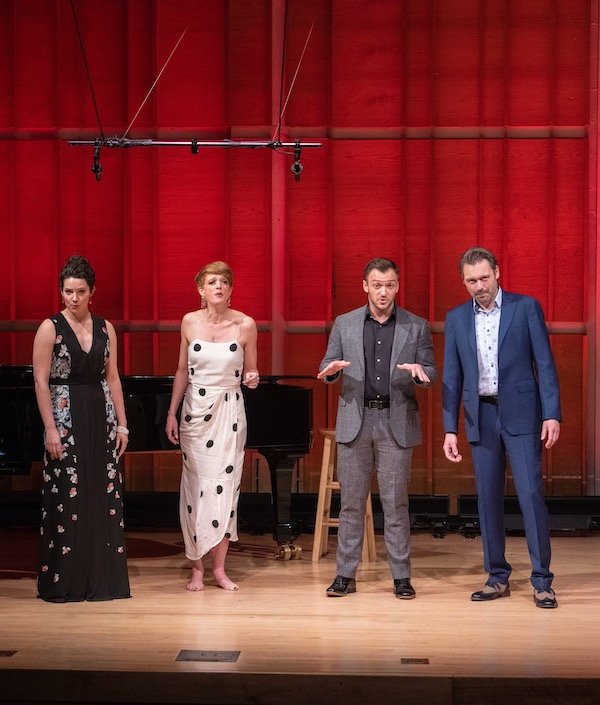Mirror Visions Ensemble works its “Midnight Magic” in dizzyingly eclectic program

It may have been a sunny Sunday afternoon outside on West 67th Street, but inside Merkin Concert Hall some “Midnight Magic” was going on, as Mirror Visions Ensemble presented songs from many times and places, all conceived in (or at least referring to) the middle of the night.
If that sounds like a recipe for a lot of dark, gloomy music—well, sometimes it was. Hugo Wolf’s song “Nachtzauber” (Night Magic) not only gave the concert its title, but throbbed at mid-program with dark rumblings in Max Hammond’s piano, while baritone Mischa Bouvier’s oak-toned, finely-supported singing told of a valley drenched in moonlight and pangs of lost love.
But it was Zauber of another sort that stopped the show a few songs earlier, as Bouvier and soprano Mireille Asselin lit up the stage with Papageno and Papagena’s delirious love duet (“Pa…pa…pa…”) from Mozart’s Die Zauberflöte.
Sharp shifts were the order of the day. In the first song group alone, Harold Arlen’s “That Old Black Magic”—in a deconstructed arrangement by Andrew Gerle, deftly sung by mezzo-soprano Abi Levis and tenor Daniel McGrew—gave way in quick succession to Debussy, Gilbert & Sullivan, Ruth Crawford Seeger, and contemporary musical theater icon Adam Guettel.
Respectively, those items were: “Clair de lune,” burnished and liquid, from Asselin; “My name is John Wellington Wells,” trademark G&S patter from Bouvier; “White Moon,” delicately atonal, from Levis (with a projected full moon rising stage right); and “Saturn Returns” from the song collection Myths & Hymns, a ringing avowal by tenor McGrew. Pianist Hammond was the stylish scene-setter for each of these, and throughout the evening.
Hammond sitting at the piano, and Asselin leaning an arm on it, leaped and twittered through the gently jazzy, wordless “Midnight Vocalise,” commissioned from Harold Meltzer for this program. Rachmaninoff’s “In the Silence of the Night,” Op. 4, no. 3, started softly enough but soon was chugging with that composer’s characteristic piano energy and Bouvier’s focused baritone.
Respighi’s “Pioggia” (Rain) turned the energy up still further, as pelting rain swirled in the piano and McGrew ached for a love that could be revived as the rain did for his garden. In contrast, Bob Telson’s keening love song “Calling You” (from the 1987 film Bagdad (sic) Cafe), received a throttled-back but sustained rendition from Levis, perched on a stool. Mozart’s lovers came next, and all restraints were off, right up to the ardent final pa-pa-embrace.
Next the program took a fast trip from lieder to Broadway. Hugo Wolf’s dark vision was preceded by its opposite, as Mendelssohn’s “Neue Liebe” (New Love) found that composer in his frothiest mood; Asselin was the lively narrator as pianist Hammond sprinkled fairy dust everywhere.
The mournful dissonance of a train whistle set the wheels clacking in Britten’s “Midnight on the Great Western,” as McGrew intoned the musing Thomas Hardy lyric with impeccable diction. In another stark contrast, Levis seethed and screeched as Stephen Sondheim’s Witch, bitterly mocking the other characters of Into the Woods in her fiery exit aria “Last Midnight.”
Next, poet Langston Hughes had his moment in the spotlight—or rather, the moonlight—with four songs: The three-line poem “Winter Moon” flickered by in an elegantly sparse 1936 setting by Margaret Bonds, as both the projected moon and McGrew’s tenor rose high. In Ricky Ian Gordon’s “Harlem Night Song,” McGrew and Levis danced over the rooftops to a light Latin beat.
Hughes’s eloquent poem “Hold Fast to Dreams,” as set by Carlos Simon for this program, was by turns tender (with Bouvier), jazzy (McGrew), driven (Levis), and hymn-like (all three). In contrast, Florence Price’s 1945 setting of the same text packed its two minutes’ duration with operatic gestures and high notes, powerfully delivered by Asselin.
In a gentle piano solo, Hammond rendered Fred Hersch’s “Little Midnight Nocturne” as a simple melody gradually immersed in swirling scales. “A Clear Midnight,” the meditative opening movement of Russell Platt’s Walt Whitman cantata From Noon to Starry Night (another MVE commission), featured Asselin, McGrew and Bouvier in fine ensemble singing, shaping long phrases together and even matching their vibrato.
In Schumann’s melancholy “In der Nacht” from Spanisches Liederbuch, Op. 74—a late work in more than one sense—the composer’s wayward harmonies verged on the atonal as McGrew’s voice intertwined with Asselin’s like the ghost of a lost lover.
For an upbeat closer, the entire ensemble launched into another MVE commission, a rock ‘n’ roll arrangement by Griffin Strout of the old prison song “Midnight Special,” about a night train that symbolized escape and freedom. Creedence Clearwater Revival had a hit with this folk ode in the 1970s, but on Sunday the twangy dialect sounded a little odd coming from these sophisticated performers.
No matter—a roomful of denizens of The City That Never Sleeps clapped along, then pronounced its verdict on “Midnight Magic” with warm applause.
New York Festival of Song presents “The Wider View—Songs by Black Composers” with works by Hale Smith, Margaret Bonds, Adolphus C. Hailstork, H. Leslie Adams, Robert Owens, William Grant Still, and Harry Burleigh.8 p.m. April 13 at Merkin Concert Hall. kaufmanmusiccenter.org.